
GRANITE STATERS CONTINUE TO PRIORITIZE SOCIAL DISTANCING, BUT PERCEIVED IMPORTANCE OF RESTARTING ECONOMY GROWS
Prepared by:
DURHAM,NH - A majority of New Hampshire residents continue to believe that maintaining social distancing practices is more important than restarting the economy, but a growing number of people consider both to be important. Nearly all groups in the state consider restarting the economy to be more important than they did in early April, but significant differences remain based on gender, partisanship, and media consumption. More than a third of NH workers have lost a job or had their hours reduced as a result of the COVID-19 pandemic, largely unchanged since early April, but measures of stress concerning employment and the economy have improved. Nearly a quarter of residents left their home for work in the previous seven days but most residents are still leaving home for groceries or supplies at least once a week.
These findings are based on the Dartmouth College - UNH Survey Center New Hampshire COVID-19 Study*, conducted by the University of New Hampshire Survey Center in collaboration with the Department of Epidemiology at the Geisel School of Medicine at Dartmouth. In the most recent iteration of the survey, eight hundred thirty (830) Granite State Panel members completed a survey online between May 1 and May 5, 2020. Data were weighted by respondent sex, age, education, and region of the state to targets from the most recent American Community Survey (ACS) conducted by the U.S. Census Bureau, as well as party registration levels provided by the New Hampshire Secretary of State. The Granite State Panel is part of an effort by the University of New Hampshire Survey Center to investigate new ways of gathering and understanding the opinion of New Hampshire residents. Granite State Panel members are recruited from randomly-selected landline and cell phone numbers across New Hampshire and surveys are sent periodically to panel members.
Relative Importance of Restarting the Economy & Maintaining Social Distancing Practices
Respondents were asked whether they think restarting the economy or maintaining social distancing practices is more important when considering how long states should ask or require people to stay home. A majority (57%) consider maintaining social distancing practices to be more important, 19% consider restarting the economy to be more important, and a quarter (25%) think they are equally important. By contrast, in early April more than two-thirds (68%) considered maintaining social distancing to be more important and more than half were as emphatic as possible in that opinion.
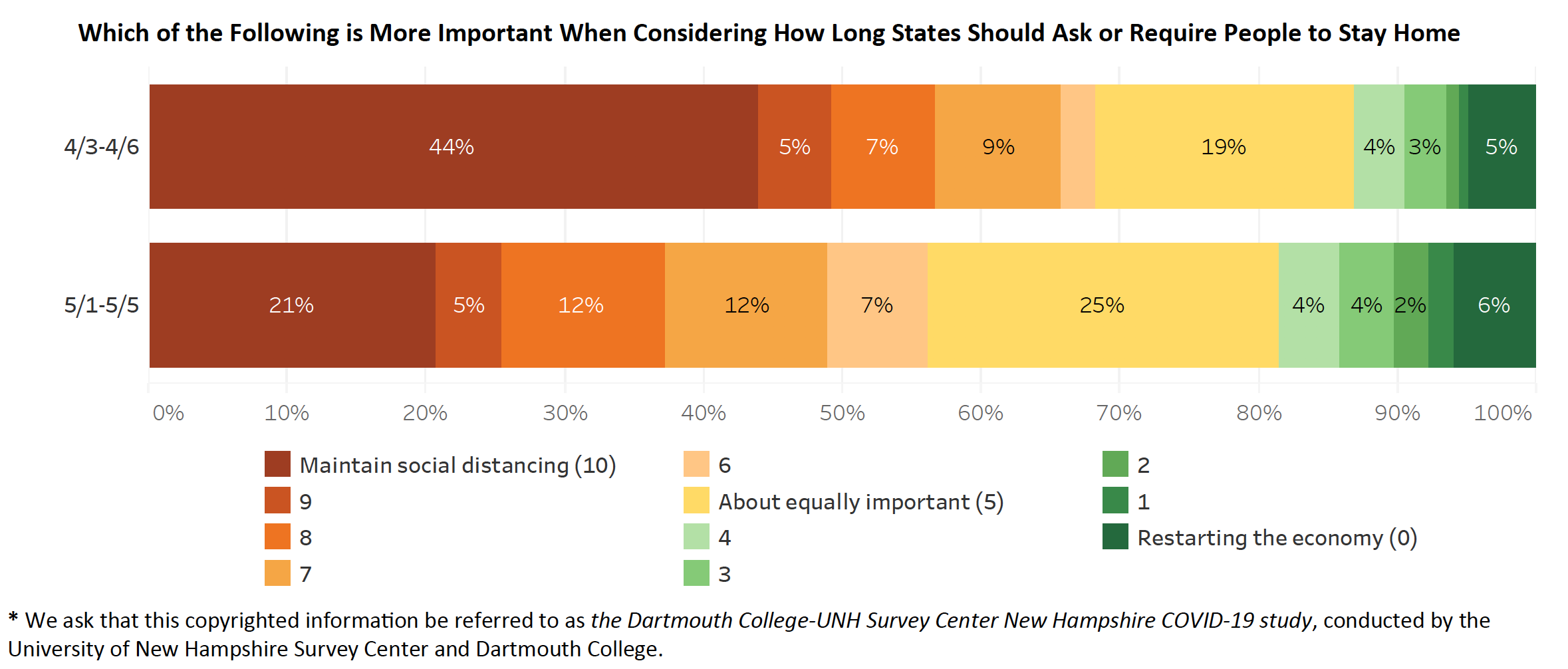
As in April, even among Granite Staters who have lost a job or had their hours reduced due to the COVID-19 pandemic, a majority believe maintaining social distancing is more important than restarting the economy. Women also continue to be a good deal more likely than men to consider maintaining social distancing to be more important than restarting the economy. New Hampshire residents are also heavily divided by partisanship on this question: 85% of registered Democrats and 73% of MSNBC viewers consider maintaining social distancing to be more important than restarting the economy but only 34% of registered Republicans and 27% of Fox News viewers agree.
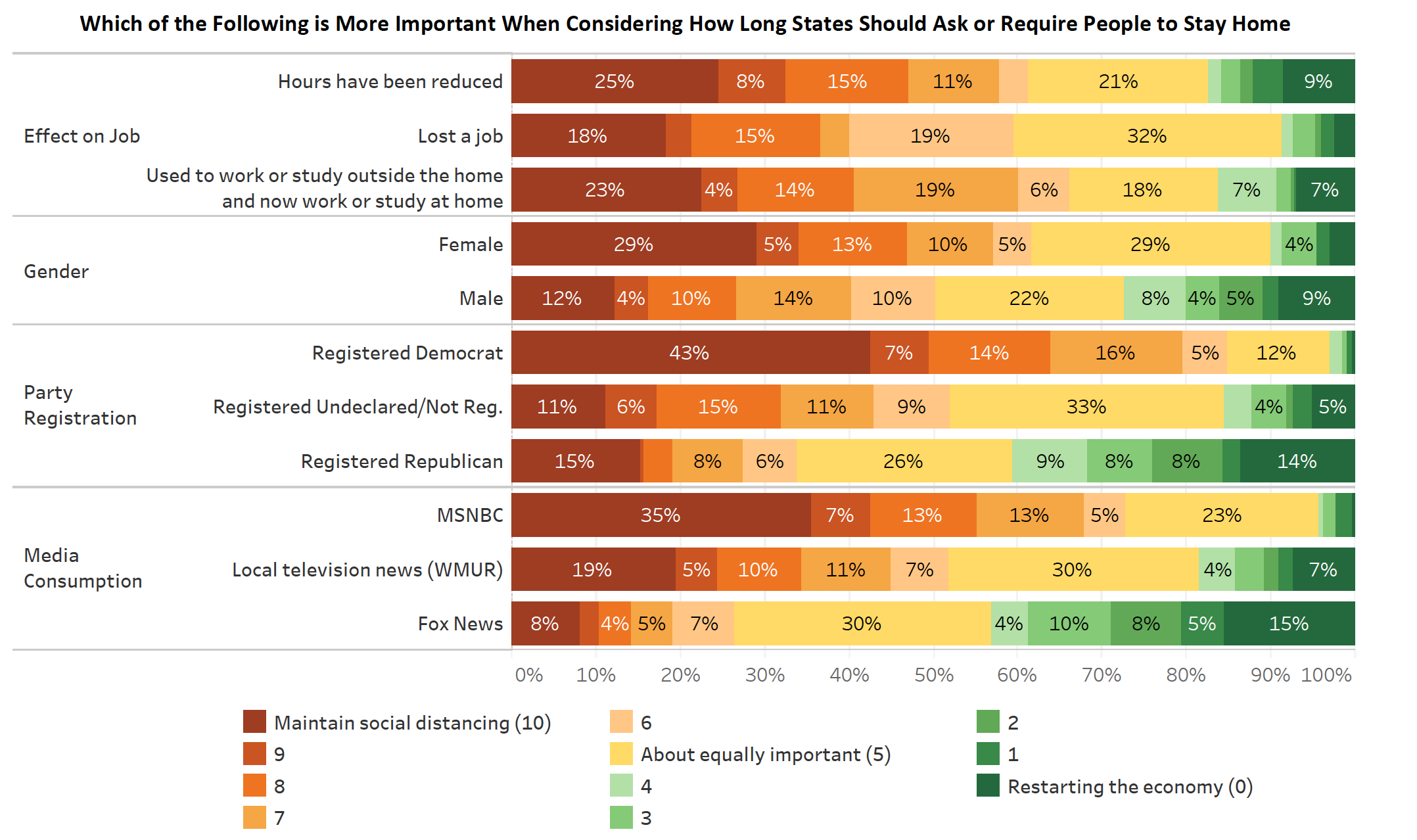
Despite considerable differences on this question, men and women both favor social distancing over restarting the economy, women more so than men. However, in the past month, women have seen a greater shift away from social distancing than men. Democrats and Republicans also have shifted by about the same amount in their opinion compared to April. However, respondents have moved in different directions since April based on age: those under 30 consider social distancing to be more important than they did in April while the perceived importance of social distancing among older age groups has declined.
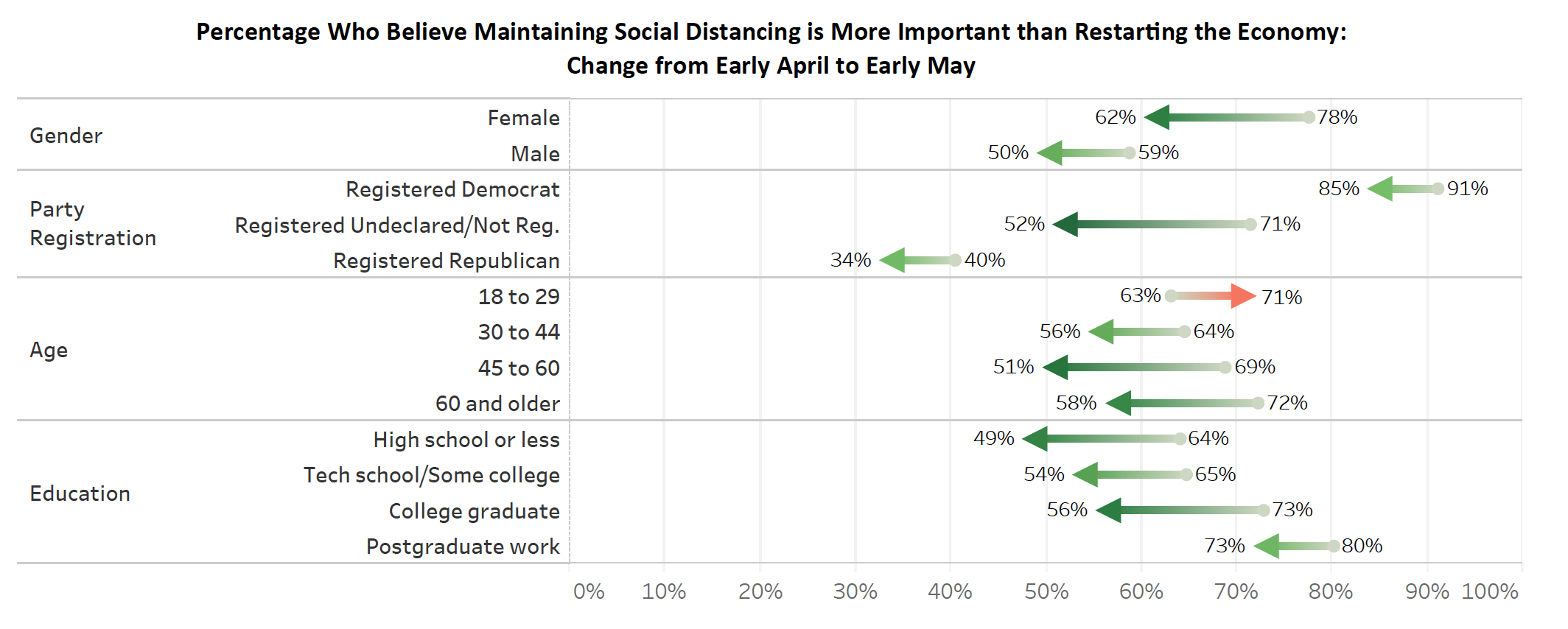
Effect of COVID-19 on Employment
As public opinion on social distancing shifts somewhat, the New Hampshire work force continues to be strongly affected by the COVID-19 pandemic. More than a third of New Hampshire residents (36%) say they have lost a job (15%) or that their hours have been reduced (22%) as a result of the COVID-19 pandemic and more than half (53%) of working households in the state have at least one member who has lost a job or had their hours reduced.
More than a quarter of working Granite Staters (28%) are now working or studying from home. Nine percent have seen their hours increase due to the COVID-19 pandemic, while 2% have started a new job. These results are largely unchanged since April.
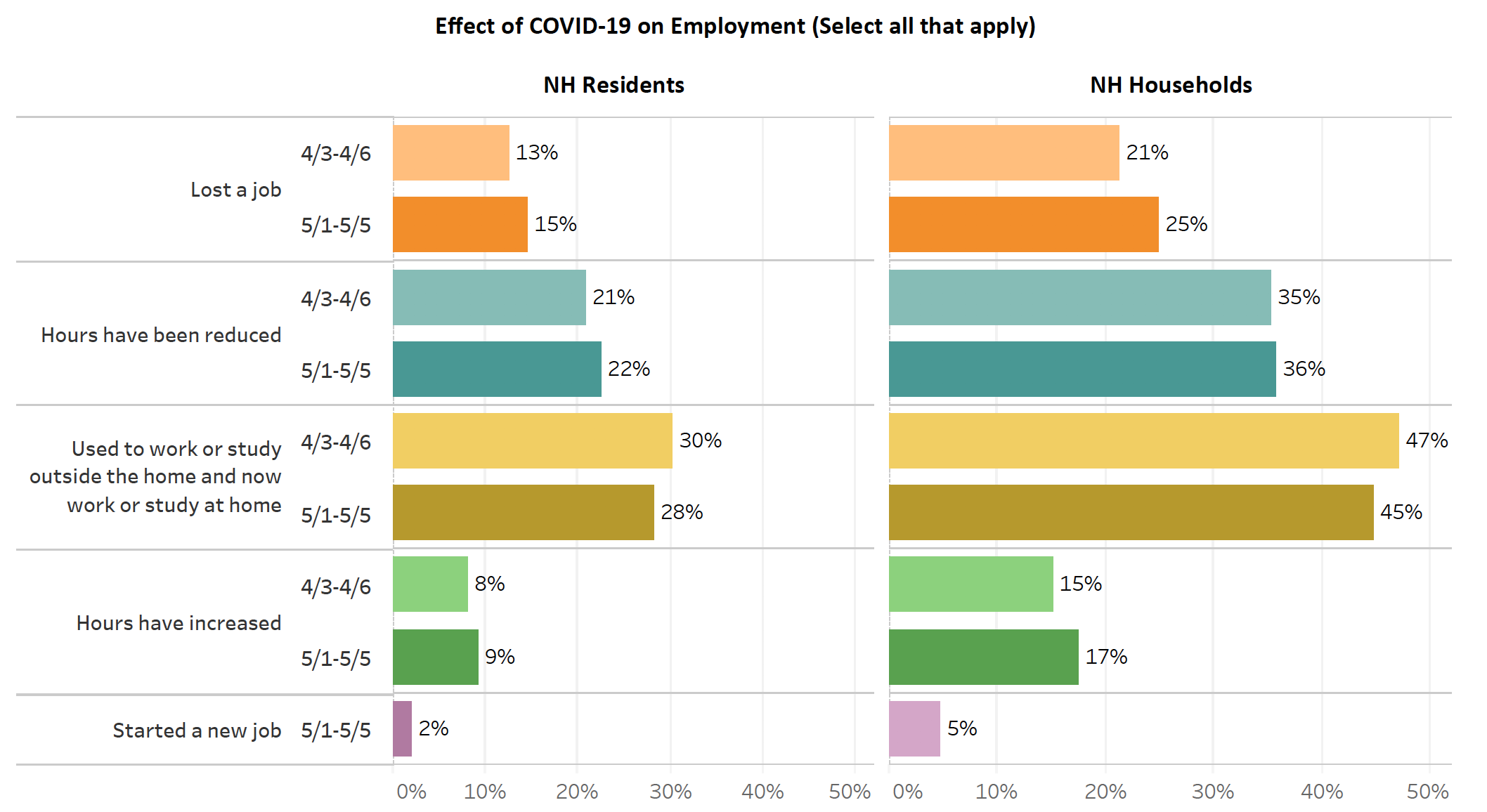
Among Granite Staters in the workforce, residents under the age of 30 remain most likely to have lost a job or had their hours reduced as a result of the COVID-19 pandemic. However, since April, differences based on age have become less pronounced as a larger number of those between 30 and 60 have lost a job or had their hours reduced. Those without a college degree remain considerably more likely than those with a college degree to have lost a job or had their hours reduced, while women are now slightly more likely than men to have lost a job or had their hours reduced.

Leave the Home
During Governor Sununu's "stay at home" order, most Granite Staters left their home multiple times in the previous seven days: only 15% did not leave their home in the previous seven days, 28% left their home 1-2 days, 34% left 3-5 days, and 16% left their home 6-7 days of the previous seven days. Only 31% of residents left their home at all in the previous seven days to go to work.
A majority of New Hampshire residents (60%) left their home at least once in the previous seven days for groceries or supplies, with 29% doing so twice or more in that time. Most Granite Staters have not left their home or socialized indoors with friends or relatives who do not live with them: only 22% did so in the previous seven days and even fewer have left home to help friends or relatives who do not live with them in their homes (14%).
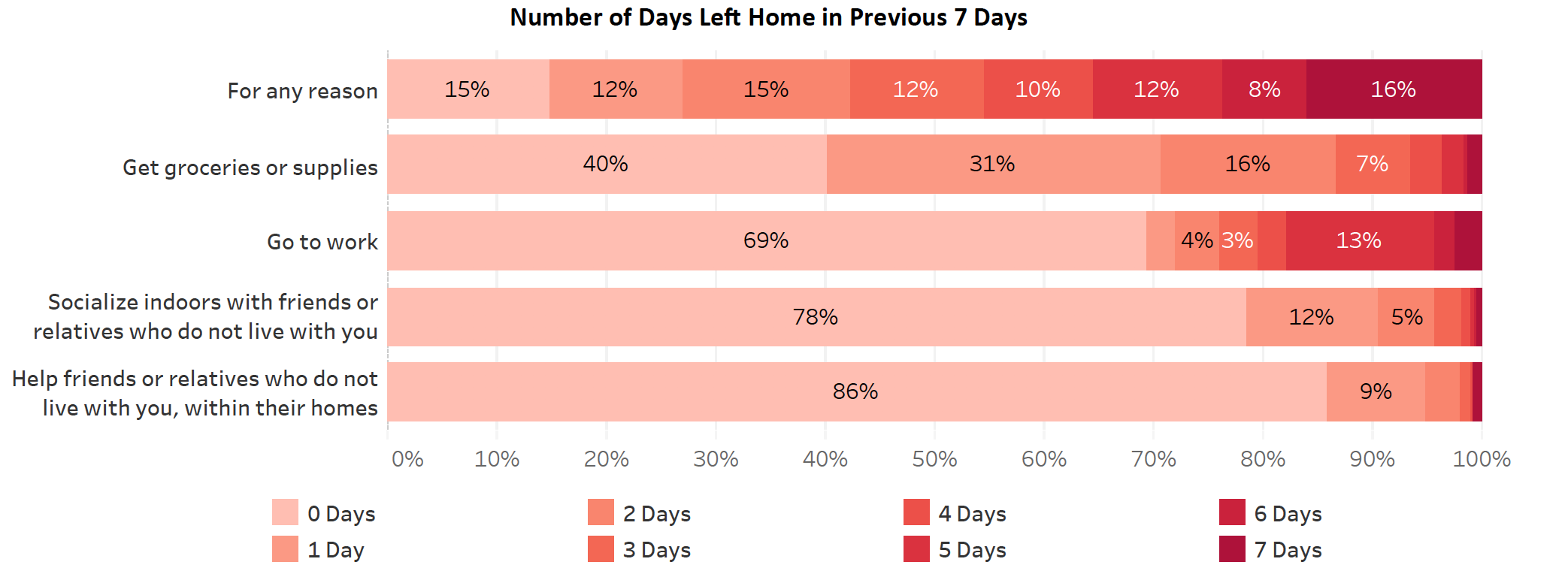
- Residents under 30 are considerably less likely than older respondents to have left the home to get groceries or supplies in the past seven days.
- Registered Republicans are nearly twice as likely as registered Democrats and those with a high school degree or less education are more than twice as likely as those who have completed post graduate work to say that they left home to go to work in the past seven days. Men are also slightly more likely than women to have left the home for this reason.
- Respondents under the age of forty-five are nearly twice as likely as those forty-five and older to say they left the home to socializeindoors with others in the past seven days while registered Republicans are nearly twice as likely as registered Democrats to have left the home for this reason.
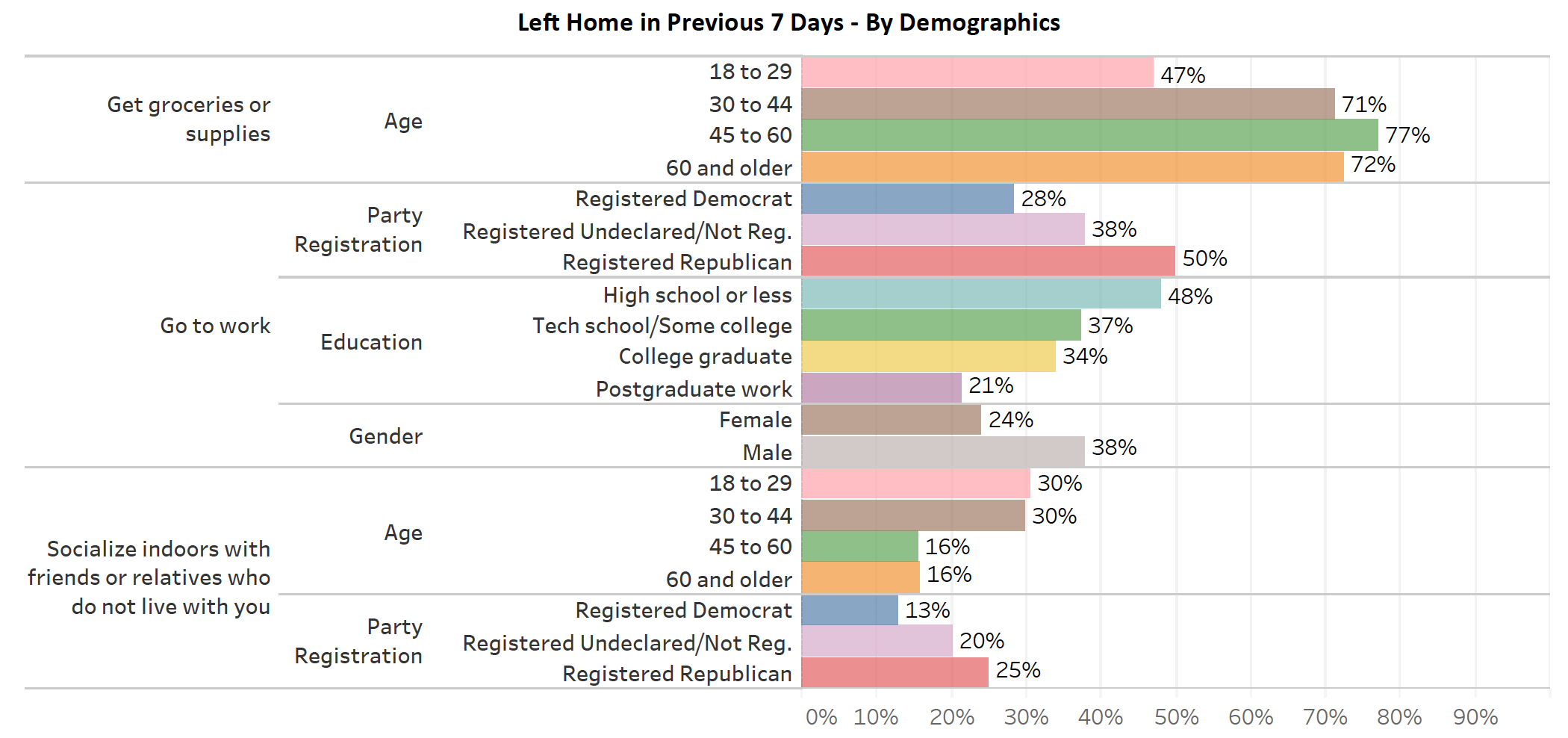
Employment and Finance-Related Stress
Compared to early April, Granite Staters are experiencing less stress related to their financial situation and employment as a result of the COVID-19 pandemic. Forty-two percent of residents are extremely or somewhat stressed about an increased workload or more stress at work, while another 42% are extremely or somewhat stressed about the loss or potential loss of their job or reduced hours or income and 41% are stressed about their family's finances.
The percentage of New Hampshire residents who are extremely or somewhat stressed about each issue has declined compared to April, with the largest drop in the percentage of people stressed about their family finances.
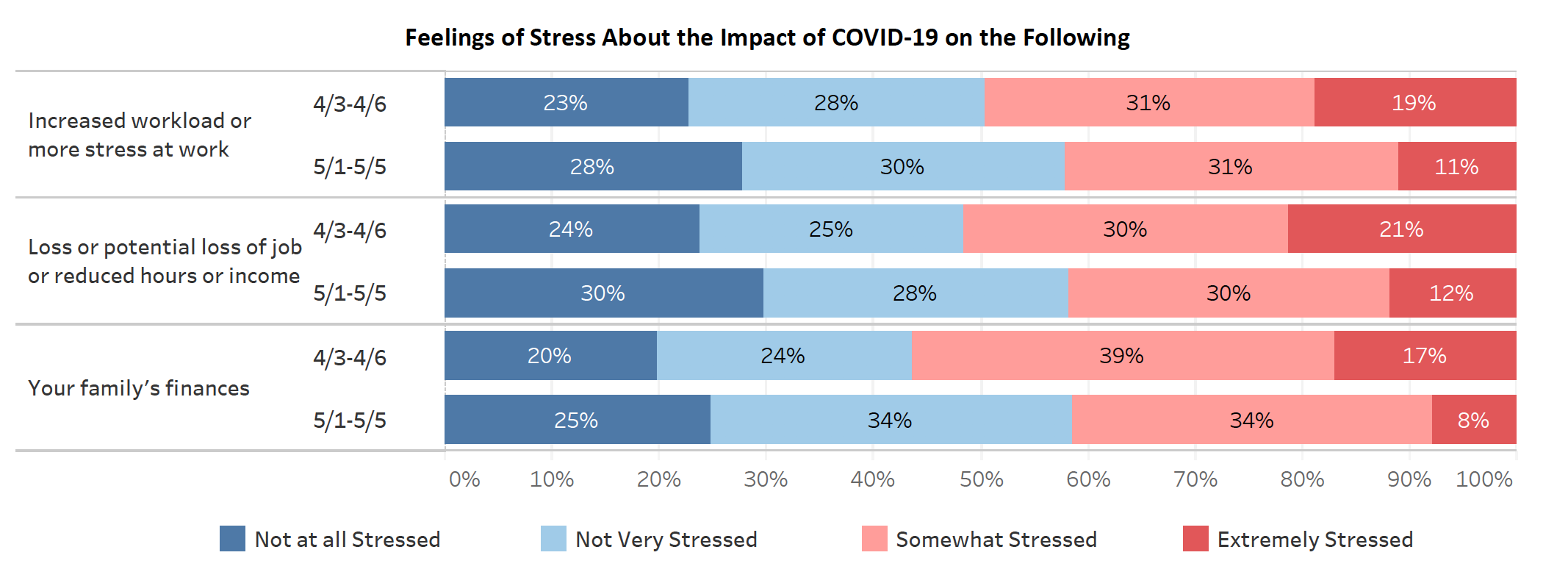
Stress related to an increased workload or more stress at work has increased since April among those under the age of 30, while stress related to this has declined among all other age groups, particularly among those aged 30 to 44.
Stress about family finances has fallen among residents of all ages and education levels as well as among both men and women. However, stress has fallen considerably among those aged 30 to 44 and those with a high school education or less. Women remain more stressed than men concerning an increased workload or more stress at work and their family finances, but stress among men and women has fallen by about the same amount since April.
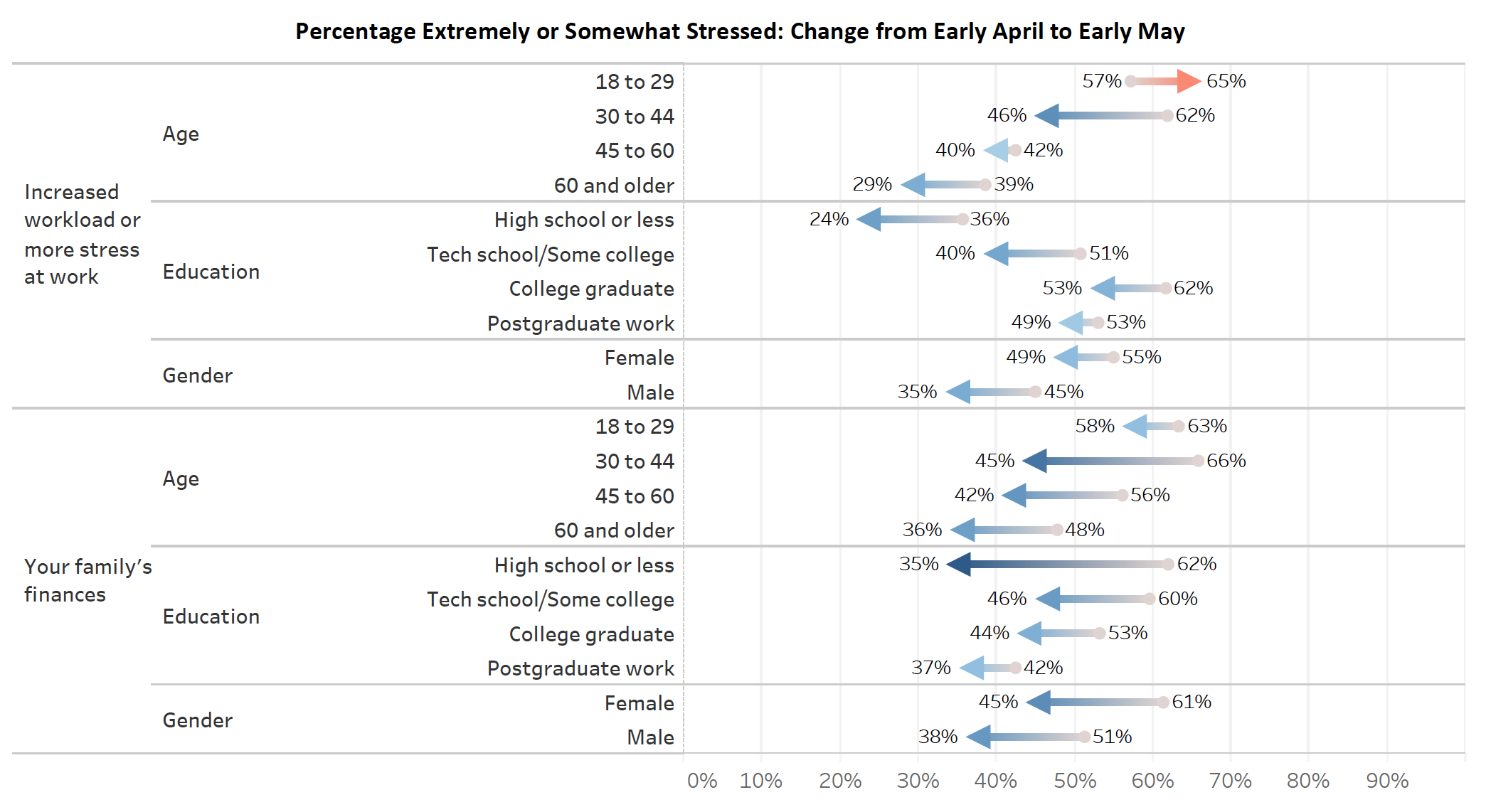
Dartmouth College-UNH Survey Center New Hampshire COVID-19 Study Methodology
These findings are based on the Dartmouth College-UNH Survey Center New Hampshire COVID-19 Study, conducted by the University of New Hampshire Survey Center in collaboration with the Department of Epidemiology at the Geisel School of Medicine at Dartmouth. One thousand and twenty-nine (1,029) Granite State Panel members completed an initial survey online between April 3 and April 5, 2020. Data were weighted by respondent sex, age, education, and region of the state to targets from the most recent American Community Survey (ACS) conducted by the U.S. Census Bureau, as well as party registration levels provided by the New Hampshire Secretary of State. The Granite State Panel is part of an effort by the University of New Hampshire Survey Center to investigate new ways of gathering and understanding the opinion of New Hampshire residents.
Granite State Panel members are recruited from randomly-selected landline and cell phone numbers across New Hampshire. Respondents to the Granite State Poll were asked if they wished to participate in further research and asked to provide an email address. Those who agreed and provided an email address were added to the panel. Panel members were also recruited by texting a random sample of cellular telephones in the state and inviting the recipient to take a short survey.
For each survey which they complete, panel members are entered into quarterly drawings to earn rewards, such as gift certificates from statewide and internet companies. Due to rounding, percentages may not sum to 100%.
For more information about the Dartmouth College-UNH Survey Center New Hampshire COVID-19 study, please visit:
https://cola.unh.edu/unh-survey-center/projects/dartmouthunh-covid-19-survey
For more information about the Granite State Panel, please contact Dr. Andrew Smith at (603) 862-2226 or by email at andrew.smith@unh.edu or visit:
https://cola.unh.edu/unh-survey-center/projects/granite-state-panel
This project is supported by emergency funding from The Hitchcock Foundation, the Jack and Dorothy Byrne Foundation, Dartmouth College COVID-19 "Spark" funding, and in-kind support by UNH Survey Center staff.